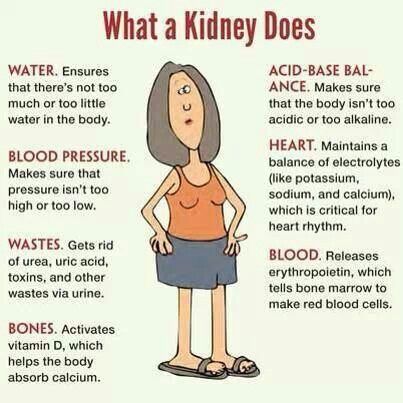Signs Of Chronic Kidney Disease
Changes in Urination: Urine is produced in the kidneys. If the kidneys are failing, urine production may change. Changes in urine can include:
Frequent urination, or greater amounts of urine than normal Urine may be foamy You get up at night to urinate more than once Urinating less often, or in smaller amounts than usual Appearance of urine is dark-colored, or blood-tinged You feel pressure or have difficulty urinating
Swelling: Kidneys also help remove excess fluid in the body. When kidneys are failing, fluid can build up in your body. Watch for signs of fluid retention that can show up in the body as swelling in your feet, ankles, hands, and face. Fatigue: Normal kidneys produce a hormone called erythropoietin, or EPO, that helps your body create oxygen-carrying red blood cells. When your kidneys fail, they make less EPO. With decreased red blood cells carrying oxygen, your brain and body tire very quickly. You can also develop anemia, an iron-deficiency. Watch for signs of fatigue, such as feeling tired even after a good sleep, sleeping a lot, and having no energy. Skin Rash/Itching: Kidneys also work to remove waste from the bloodstream. They also make red blood cells that keep your bones strong and maintain the minerals in your blood. Failing kidneys can cause a buildup of waste in your blood and decrease the number of minerals and nutrients in your blood that can cause dry skin, rashes, and itching. Metallic Taste in Mouth/Ammonia Breath: Waste building up in the blood can make food taste differently and cause bad breath. You may also notice a distaste for meat. You can also lose weight because you may lose your appetite. Shortness of Breath: Extra fluid buildup in your lungs from non-functioning kidneys can lead to shortness of breath. Anemia an also leave you starved of oxygen, making it harder to catch your breath. Feeling Cold: As explained previously, the kidneys produce the hormone EPO to signal the body’s production of red blood cells. When there are fewer red blood cells created, you can become anemic. Anemia comes with its own set of symptoms, such as fatigue, but if you feel cold, even inside of a warm room, you could be experiencing anemia with chills. Dizziness and Trouble Concentrating: Dizziness and trouble concentrating can be a result of kidney-related anemia. When your brain doesn’t get enough oxygen, it can lead to memory problems, dizziness, and trouble with concentration. Flank Pain: Many of the common causes of Chronic kidney disease do not cause any pain, but some people do experience pain in the upper back (where the kidneys are located). Polycystic kidney disease (PKD), large fluid-filled cysts on the kidneys or liver can cause pain in the upper back. Kidney infections and bladder infections can cause severe pain and burning when you urinate. Kidney stones can cause severe pain and spasms, and passing a kidney stone has been compared to child birth by some. Leg cramps: Leg cramps are a common indicator of kidney disease. Cramps are caused by an imbalance of fluid and electrolytes, or by nerve damage and blood flow problems.
What To Do If You Experience These Signs
See a physician. Although it is probably likely that you are having kidney problems, it might not be as severe as chronic kidney disease. Seeing your doctor as soon as possible narrows down what you might be suffering from. If your doctor finds that you do have kidney disease, they can get you put on a treatment immediately and you can follow the remaining tips to help improve your quality of life. Eat a healthy diet. Studies show that eating fresh vegetables, fruits, low-fat dairy, and switching to foods with less saturated fat, starches, and sweets may help slow CKD. Ask your doctor about a low-protein diet as well. Control blood sugar levels. Control of blood sugar can help slow the progression of kidney disease. Don’t smoke. If you do, quit. Smoking is linked to the amount of protein spilled in the urine in people with CKD. In smokers that have diabetes as well, CKD may progress twice as fast. Avoid certain medications. Medications that contain ibuprofen, or naproxen, and acetaminophen can affect kidney function. Avoid using a combination of these medications with caffeine, as further damage to your kidneys can be done. Get moving. Always check with your doctor first, but starting an exercise program to control your weight can keep your heart, blood vessels, muscles, and joints in healthy shape.

